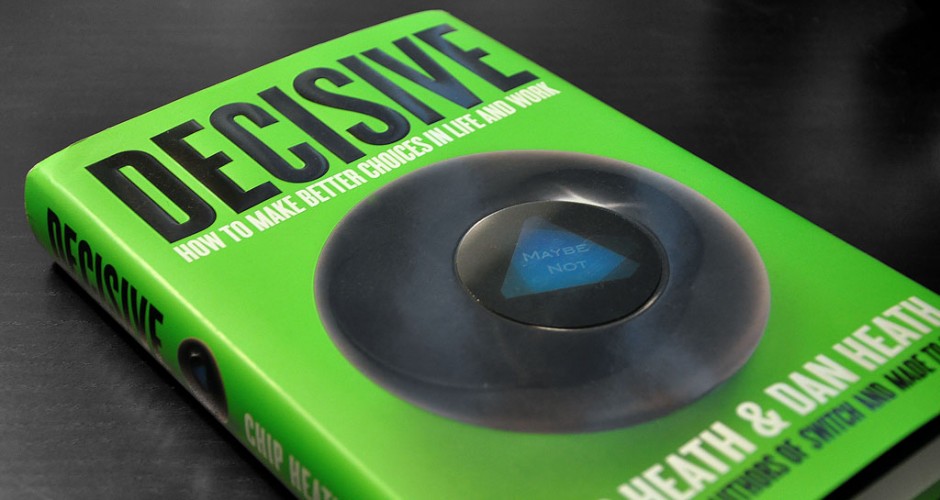Decisive
I recently finished the latest book from Chip and Dan Heath called Decisive. It is a look at the decisions we make and how our criteria for making them often produces the bad results we had hoped to avoid. I’m also having some of my team from Central go through it together as it serves as a great tool to evaluate the systems in place for any team to make decisions.
I wrote previously about a great insight from this book but here is a collection of some of my favorite ideas:
 One of the specific areas that stands out are there evaluations of the traditional hiring process. Obviously, the decisions we make in an organization to hire someone comes with tremendous consequences, either good or bad. Consider how they critique the common hiring practices:
One of the specific areas that stands out are there evaluations of the traditional hiring process. Obviously, the decisions we make in an organization to hire someone comes with tremendous consequences, either good or bad. Consider how they critique the common hiring practices:
To make better decisions, use the WRAP process: Widen Your Options. Reality-Test Your Assumptions. Attain Distance Before Deciding. Prepare to Be Wrong. [see the graphic below for an extended look at this] Multitracking keeps egos in check. If your boss has three pet projects in play, chances are she’ll be open to unvarnished feedback about them, but if there’s only one pet project, it will be harder for her to hear the truth. Her ego will be perfectly conflated with the project. There’s no “right number†of houses to see or job candidates to interview. One rule of thumb is to keep searching for options until you fall in love at least twice. If you’ve only identified one good candidate for a job, for instance, you’ll have the strong urge to talk yourself into hiring her, which is a recipe for the confirmation bias. “Who else is struggling with a similar problem, and what can I learn from them?†What if our least favorite option were actually the best one? What data might convince us of that? In a fascinating application of this principle, psychologists studied people’s reactions to their own faces. To introduce the study, let’s talk about you for a moment. This may sound odd, but you’re actually not very familiar with your own face. The face you know well is the one you see in the mirror, which of course is the reverse image from what your loved ones see. Knowing this, some clever researchers developed two different photographs of their subjects’ faces: One photo corresponded to their images as seen by everyone else in the world, and the other to their mirror images as seen by them. As predicted by the mere-exposure principle, the subjects preferred the mirror-image photo, and their loved ones preferred the real-image photo. We like our mirror face better than our real face, because it’s more familiar! To ooch is to construct small experiments to test one’s hypothesis. Given the popularity of this concept, and given the clear payoff involved—little bets that can improve large decisions—you might wonder why ooching isn’t more instinctive. The answer is that we tend to be awfully confident about our ability to predict the future.
 One of the specific areas that stands out are there evaluations of the traditional hiring process. Obviously, the decisions we make in an organization to hire someone comes with tremendous consequences, either good or bad. Consider how they critique the common hiring practices:
One of the specific areas that stands out are there evaluations of the traditional hiring process. Obviously, the decisions we make in an organization to hire someone comes with tremendous consequences, either good or bad. Consider how they critique the common hiring practices:
Sometimes we think we’re gathering information when we’re actually fishing for support. Take the tradition of calling people’s references when you want to hire them. It’s an exercise in self-justification: We believe someone is worth hiring, and as a final “check†on ourselves, we decide to gather more information about them from past colleagues. So far, so good. Then we allow the candidate to tell us whom we should call, and we dutifully interview those people, who say glowing things about the candidate, and then, absurdly, we feel more confident in our decision to hire the person. (Imagine if we bought a time-share because the salesman had three awesome references.) Imagine if the U.S. Olympic track coach used two tests in selecting the men who’d run on the 4×100 relay team. Test 1: Get the man on the track to see how fast he runs. And test 2: Meet him in a conference room and see if he answers questions like a fast runner would. Note that in most of Corporate America, our hiring process looks more like test 2 than test 1. Let’s all slap our foreheads in unison. Research has found that interviews are less predictive of job performance than work samples, job-knowledge tests, and peer ratings of past job performance. Even a simple intelligence test is substantially more predictive than an interview. Next time you’ve got a job opening to fill, consider Steve Cole’s advice. What’s the best way you could give your potential hires a trial run?
Do You Want to Read the Bible Without Falling Behind?
Sign up your email and I’ll send you a PDF to download and use my custom-made reading plan system. There’s no way to fall behind on this system and every day will be different no matter how long you use it!
I’ll send future content directly to your inbox AND you can dive into the Bible like never before.





